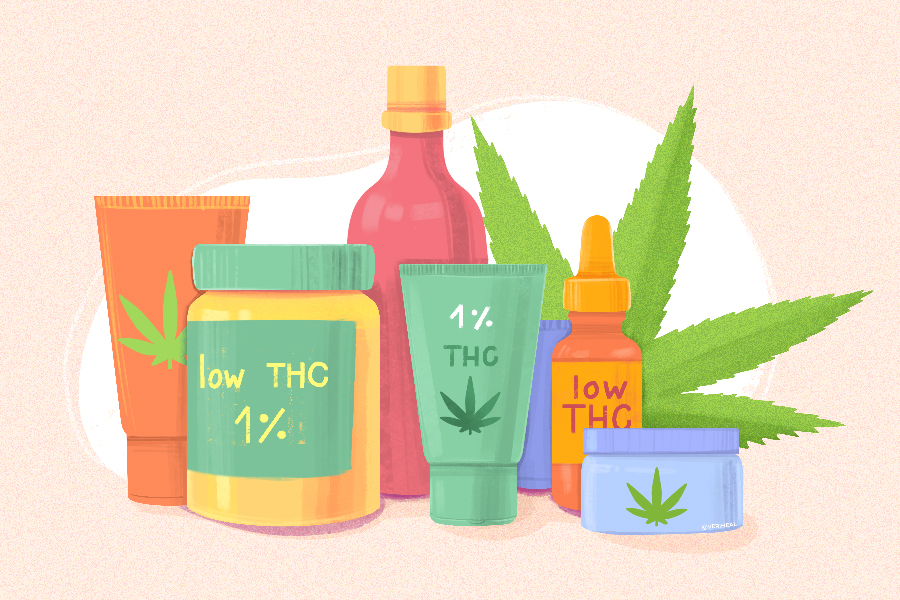Cannabis is one of the most famous plants on the planet, with the first recorded use dating back to 2800 B.C. when it was featured in Emperor Shen Nung’s pharmacopeia. Now, as legislation spreads across the world and we begin to unlock more science about the natural substance, we are learning more about one of its most abundant (and formerly misunderstood) cannabinoids: tetrahydrocannabinol (THC).
Due to its diversity, THC has branched off into a field of its very own. Nope, we’re not talking about using the cannabinoid for its recreational appeal—we’re focusing on what THC can do for medical patients who consume the compound in low quantities.
This is where low-THC therapy comes in.
What Is Low-THC Therapy?
THC, despite being acknowledged as a psychoactive constituent of the cannabis plant, possesses immense power in terms of what it can do for the human body. Aside from its relaxing and euphoric effects, THC may help to relax muscles in MS patients, promote a good night’s sleep, increase appetite, and control chemotherapy-related nausea.
Every human being has two kinds of cannabinoid receptors inside their body, CB1 and CB2. In order to release its effects, THC must first bind with and stimulate these receptors in the brain. When this happens, THC produces a “high” in users.
By attaching to those cannabinoid receptors, THC arouses neurons that help to regulate coordination, memory, pleasure, thinking, and time perception. When administered in the form of low-THC therapy, a patient will receive 0.8% or less of the psychotropic cannabinoid (enough to cause a mild high) and over 10% CBD.
Is There Scientific Proof of THC’s Remedial Qualities?
Although some skeptics and prohibitionists remain firm against the use of cannabis in the field of medicine, there is some anecdotal evidence and research pointing to THC’s use for a broad scope of medical conditions.
For example, a large-scale 2015 systematic review assessed cannabis studies on patients who had been diagnosed with chronic pain and discovered that THC boosted the chances of pain improvement by 40%. A small 2010 study of chemotherapy patients discovered that those who consumed a THC-based medicine at the same time as standard chemo methods endured less nausea and vomiting than patients who only underwent chemo.
Why You Should Get Your Medical Marijuana Card
Veriheal has satisfied millions of patients nationwide by giving them access to these benefits
- Larger purchase limits
- Peace of mind
- Enhanced legal protection
- Access to higher potency strains
- Save up to 25% on cannabis purchases
- Skip the line at the dispensary
A broad 2015 systematic review found that patients experienced fewer muscle spasms when they consumed THC in conjunction with other cannabinoids as opposed to a placebo. However, researchers noted that the difference in the results wasn’t significant.
Types of Low-THC Therapy
The method of administration for low-THC products is dependent on the results of your medical evaluation and personal preferences. Some of the most common formulations include:
- Topical creams and patches
- Flower
- Concentrates (e.g., shatter, wax, and oil)
- Cannabis-infused edibles (baked goods, candies, and drinks)
- Tinctures
Examples of some medical conditions that may be relieved with low-THC therapy include:
- Amyotrophic lateral sclerosis (ALS)
- Cancer
- Crohn’s disease
- Chronic pain disorders (e.g., fibromyalgia and migraines)
- Epilepsy and seizures
- Glaucoma
- HIV/AIDS
- Multiple sclerosis (MS)
- Parkinson’s disease (PD)
- Post-traumatic stress disorder (PTSD)
Whether you choose to inhale, ingest, or topically apply THC-containing products, the cannabinoid will release its effects after first stimulating cannabinoid receptors inside the brain. Once these receptors inside the brain indirectly react with THC, pain levels are reduced and the symptoms are diminished.
What Strains Are Low in THC?
A low-THC strain of cannabis that contains a generous amount of the non-intoxicating compound CBD (cannabidiol) is recommended for people who want to enjoy potential relief from medical conditions like pain, stress, seizures, inflammation, and anxiety but who also want to remain productive, focused, and clear-headed.
Listed below are a few low-THC strains worth trying:
- ACDC (<1% THC and 15% CBD) – This balanced hybrid strain is renowned for its skunky aroma and underlying lemon tones.
- Charlotte’s Web (1% THC and 17% CBD) – A strain that has earned fame around the world, this indica-dominant strain is mildly relaxing yet slightly uplifting.
- Harlequin (7-15% THC and 10-15% CBD) – This well-known sativa-dominant strain contains more THC than any other strain on the list. However, due to the high CBD content, the effects of THC are offset.
- Harle-Tsu (1% THC and 10% CBD) – A blend of Harlequin and Sour Tsunami, this indica-heavy strain usually doesn’t exceed 1% THC, but the CBD content has been known to exceed 22% in some cases.
Other Considerations
While the benefits of low-THC therapy cannot be ignored, it’s important to note that THC can interact with other types of medications as well as certain types of food and drink. On that note, consult with a doctor to get the go-ahead before attempting low-THC therapy.
Products containing more than 0.3% THC are also federally illegal, and such products might trigger a positive drug test—something to think about if your employer conducts random drug testing. Finally, make sure you get your hands on real THC, since some prescribable drugs like Marinol and Syndros contain a synthetic form of the cannabinoid.
Author, Share & Comments







